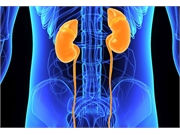
New hepatitis C medications are allowing people to receive a kidney transplant from a deceased donor who had the liver disease — a strategy aimed at getting more lifesaving organs to patients languishing on waitlists.
Two new studies are highlighting the promise of the approach, showing that if patients are given the drug Mavyret, they can safely receive the kidneys and the organs function well.
Experts said the hope is to use some donor kidneys that would otherwise be discarded, and shorten the wait time for some of the thousands of Americans who need a kidney transplant.
“The challenge we have in organ transplantation is the supply doesn’t meet the demand,” said Dr. Matthew Cooper, director of kidney and pancreas transplantation at Medstar Georgetown Transplant Institute, in Washington, D.C.
Close to 100,000 Americans are on the waitlist for a donor kidney, according to the National Kidney Foundation. Yet around 20% of kidneys procured from deceased donors are discarded, said Cooper, who is also on the foundation’s board of directors.
That happens for various reasons, but experts believe more of those rejected kidneys could be transplanted. One recent study, for example, found that people who received donor kidneys with signs of “acute injury” fared just as well as patients who received organs without injury.
Yet transplant centers commonly reject kidneys with acute injury.
One way to address the shortage in donor kidneys, Cooper said, is to figure out how to make better use of the organs that are procured each year.
That’s why, in the past several years, some transplant centers have been using kidneys from deceased donors with hepatitis C.
Hepatitis C is a liver infection that can cause serious chronic disease. In the past, donor organs positive for hepatitis C would be discarded, except in limited circumstances where the recipient also had a history of the infection.
Historically, the drugs used to treat hepatitis C were hard to take and only modestly effective — curing around 40% of patients, and causing flu-like symptoms over the one-year course of treatment.
That has changed in recent years, as a number of new, direct-acting antivirals have been approved.
The new medications are much more effective than the old drugs — with cure rates exceeding 98%, explained Dr. Niraj Desai, senior author on one of the new studies.
They are also far safer, said Desai, who is surgical director of kidney and pancreas transplant at Johns Hopkins Medicine, in Baltimore.
Now the question is how to best refine the course of antiviral treatment: When is the best time to begin, and how long do transplant recipients need to take the medication for it to be effective?
The main issue with the new drugs, Desai pointed out, is their hefty price tag.
He and his colleagues have found that one month of treatment with a drug combination called Mavyret may be enough. They gave 10 transplant recipients the medication — starting just before the transplant, and then daily for four weeks.
None became infected with hepatitis C, or had serious side effects from the drug.
Desai’s team reported the findings in the Sept. 8 issue of Annals of Internal Medicine. The work was funded by the U.S. National Institutes of Health.
The report comes on the heels of a larger study in the Journal of the American Society of Nephrology. It found that eight weeks of treatment with Mavyret allowed 30 patients to safely receive a kidney transplant from a deceased donor with hepatitis C.
That study was funded by Mavyret maker AbbVie Inc.
According to Cooper, it remains unclear what the ideal medication regimen is. A shorter course, if just as effective, would obviously be better from a cost standpoint. Mavyret, for instance, reportedly costs around $13,000 per month.
Cooper said it’s important to keep the bigger picture in mind, however: Kidney dialysis, which keeps transplant candidates alive while they await an organ, is a huge expense.
And how do these transplant patients fare in the long run?
At this point, researchers have been able to follow recipients for as long as four years. And so far, Desai said, it looks like the kidneys function at least as well as those from deceased donors who did not have hepatitis C.
Desai suggested that patients on the waitlist talk to their transplant center about whether this is an option for them. To receive a transplant from a hepatitis C-positive donor, waitlist patients must be signed up as willing to accept such an organ.
Cooper had the same advice. “Not all transplant centers do this,” he said. “But it is something to ask about, because it might reduce your waiting time.”
More information
The National Kidney Foundation has more on kidney treatment.
Source: HealthDay
Copyright © 2025 HealthDay. All rights reserved.

Leave a Reply